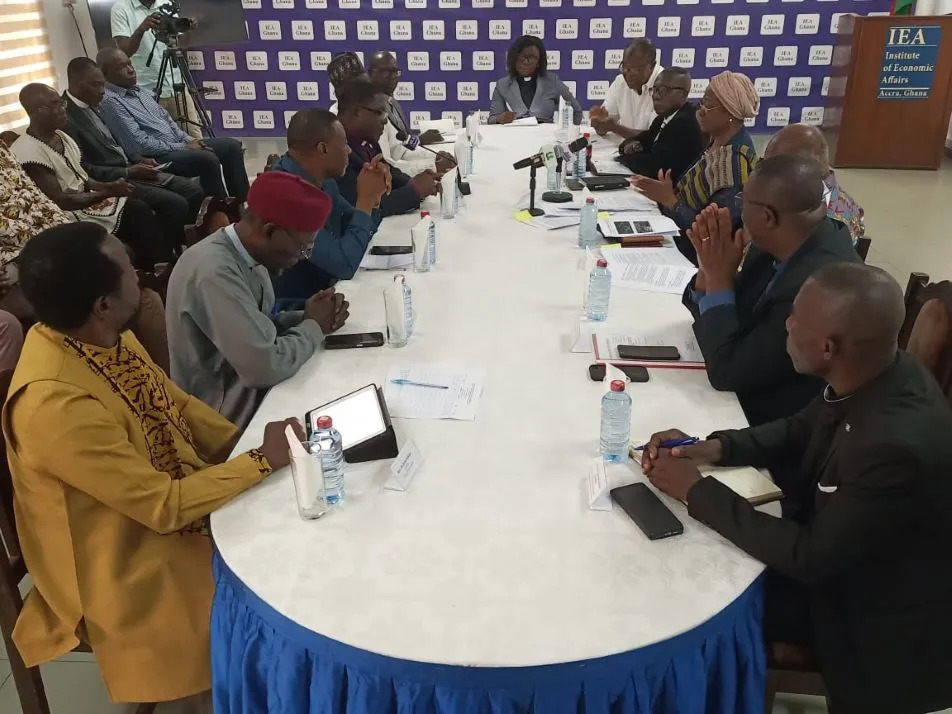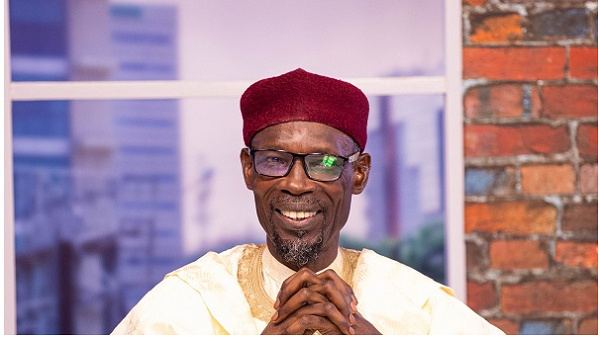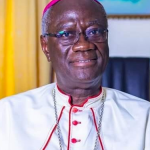Sheikh Aremeyaw Shaibu, the spokesperson for the National Chief Imam, has advised the government to begin dialogue with stakeholders on the Lithium mining agreement.
He claims that because the President holds the natural resources in trust for the people, it is critical to seek the concerns of the governed before mining the mineral resources.
“The mineral resources of our country do not belong to us alone but belong to children unborn. Once the mineral resources of our country are supposed to be kept in trust, those who manage do not own it, they are accountable to the largest sector of the society.
“For them to engage in such a contract there must be an engagement where the people are satisfied,” he stated on Tuesday, December 12, at a meeting with the Christian Council and the Council of State.
Sam Okudzeto, a member of the Council of State, stated that the Lithium agreement is not in the best interests of the country.
“The lithium agreement is not in the interest of Ghana, that is my view and if you will agree with me, then let us make a statement in support of the IEA to say that we do not think that this agreement is in the interest of Ghana,” he remarked.
On what MPs should do, he stated: “I don’t even want to condemn our MPs, we will caution and advise them to do what is right.”
The Minority in Parliament has requested that the government submit before the House the 15-year mining lease with Barari DV Ghana Limited before the start of lithium mining at Ewoyaa in the Central Region’s Mfantseman Municipality.

Ranking member on the Mines and Energy Committee, John Jinapor, said that per Article 268 of the 1992 Constitution, an agreement of this nature should first go to Parliament for approval.
The Yapei Kusawgu lawmaker told journalists in Parliament on Thursday, December 7 that, “Article 268 of the 1992 Constitution is explicit and it states that any transaction, inclduing but not limited to the application for a license to exploit natural resources requires prior parliamentary approval. On this note, I want to make it loud and clear that the agreement between the government of Ghana and Barari DV should be laid before Parliament without delay.
“Let me assure the people of Ghana that the Minority will not let you down. We will scrutinize the agreement, we will not allow this agreement to be rushed through. We will seek the guidance and the involvement of civil society, and we will speak to important personalities including former Chief Justice, Justice Sophia Akuffo who has been vocal on this Lithium agreement. The new order is lithium. Lithium is more profitable than gold, lithium is more profitable than diamond and the world order is moving to this green mineral. So, the Minority will insist that Ghana benefits from these resources and that the terms and agreement, if they are not in the interest of Ghana, the Minority will kick against that.
“We demand that the Akufo-Addo government tables or lays this agreement before Parliament without delay. Let me caution Barari that any attempt to commence mining without parliamentary approval will be illegal. A future NDC government, upon assumption of office on January 7, 2025, all mining licenses that have not met the necessary parliamentary approval, we will do the proper thing and ensure that they cease until they seek the right approval from Parliament. ”
The Minister of Lands and Natural Resources, Samuel Abu Jinapor, indicated that the agreement may require legislative approval.
He emphasized that Parliament must approve the agreement before it becomes completely legitimate.
He made the remarks during a press conference in Accra on Thursday, December 7, during which he explained the terms of the agreement.
It should be noted that former Chief Justice of the Republic of Ghana, Sophia Akuffo, stated that the lithium lease was invalid unless ratified by Parliament.
According to her legal opinion, this specific transaction should have been submitted to Parliament for approval.
“My legal view is that it is a transaction that requires ratification, it is not complete. This is a document, it is signed and sealed and delivered, but it is a deal that has to be ratified by a named authority, that is the Parliament of the Republic of Ghana,” she said while speaking as a Distinguished Scholar of the Institute of Economic Affairs (IEA) in Accra on Tuesday, November 28.
Madam Sophia Akufo further stated that, despite assertions that this specific arrangement is beneficial to the country, the pact is no different from prior ‘Guggisberg-type’ agreements that have not benefited Ghanaians.
“The Minister of Lands and Natural Resources and the CEO of Minerals Commission have touted as favorable to Ghana, surpassing all those other Lithium leases around the world.
“It is not different in principle in the substance from any of Ghana’s previous colonial times types of agreements, some call it the Guggisberg model, whatever description, all those agreements are colonial type of agreements, which over the years have yielded very little good to the overall benefit of the average Ghanaian.
“In modern best practices the exploitation or extraction of mineral resources discovered by either a joint venture agreement whereby the host country takes an agreed ownership in the mining company or a service contract whereby the host country is the owner, contracts the mining company and the mining company can be selected through transparent competitive bidding process to mine the mineral and to reinvest for its cost of reduction plus profit margin so that the mining company is in contract to the owner. The ownership of the mining remains completely in the hands of the state,” she said.
But addressing the press conference, Samuel Abu Jinapor said after hinting at seeking parliamentary approval that, “Suffice for me to point out that it is the first time in the history of our country that we have successfully negotiated for 10 percent royalties for any mineral which is one of the highest for the exploration of any mineral across the world.”
He added “We have already secured 19 percent state participation in this mining company with the requirement to scale it up to a minimum of Ghanaian participation through listing on the Ghana Stock Exchange for shares to be made available to Ghanaians and Ghanaian entities.
“What this simply means is that when it is all over, Barari DV Limited, the holder of this mineral right of lithium, Ghanaian and state participation will be 30 percent and foreign participation will be a maximum of 70 percent and this has never happened in the history of our country in respect of any mineral.
“And for the first time in the history of our country, a mineral lease contains provision for the establishment of a refinery and that is value addition and appreciation and this is the first time.”
Ghana granted a 15-year mining lease to Barari DV Ghana Limited, a subsidiary of Atlantic Lithium Limited, to commence the construction and mining of lithium at Ewoyaa in the Mfantseman Municipality of the Central Region.
The lease incorporates new and enhanced terms intended to ensure that the country benefits, optimally, from this mineral. This includes an increase in royalty rate, state and Ghanaian participation, as well as value addition to the mineral mined.
The granting of the mining lease followed the completion of prospecting and feasibility studies by the company, as well as series of negotiations between the Government and the Company.
The lease covered an area of approximately 42.63 square kilometres, and grants the company the exclusive right to work and produce lithium and associated minerals in the area, in accordance with the mining laws of the country.
Lithium is one of the main minerals used in the production of lithium-ion batteries, which is being promoted as a substitute for fossil fuels, as the world continues to battle with climate change.
Emissions from the burning of fossil fuels by the internal combustion engines have been identified as one of the major contributors to the climate crisis.
To deal with this, global leaders are promoting a green energy transition, to progressively limit, and ultimately, eliminate carbon emissions.
Already, some countries have passed laws to phase out vehicles that use fossil fuels. This has created an emerging market for the battery industry, and minerals required for the production of batteries, referred to as green minerals or critical minerals.
Currently, African countries that are mining lithium export the mineral in its raw state.
Barari Ltd commenced exploration for lithium in the country in 2017 and discovered high grade lithium in commercial quantities in Ewoyaa.
Geological research have also revealed deposits in several regions of the nation, primarily in Cape Coast, Kumasi, Sunyani, Bole, and Wa. However, the government has yet to begin mining for this mineral.
Earlier, at a brief ceremony to sign a mining lease for Barari DV Ltd., Mr Abu Jinapor stated that the government decided not to treat this mineral in the same manner as other minerals.
Before issuing any mining license, it was therefore required to create a unique strategy for the exploitation and administration of this mineral.
Following a series of discussions, he stated that Cabinet adopted a policy for the exploitation and management of green minerals, including lithium, and that the mining lease awarded to the firm contains the policy authorized by Parliament.
“The Lease we are signing today differs from our standard Mining Lease, in that, it incorporates the agreed terms we have concluded with the company, based on the Policy approved by Cabinet,” the Minister explained.
Mr. Jinapor stated that the negotiated terms provide better value to the government and people of Ghana in the mining of this mineral.
















